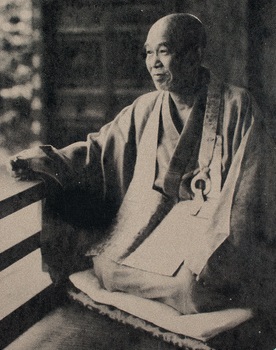ZEN MESTEREK ZEN MASTERS
« Zen főoldal
« vissza a Terebess Online nyitólapjára

後藤瑞巌 Gotō Zuigan (1879–1965)
Gotō Zuigan was a Buddhist Rinzai Zen master the chief abbot of Myōshin-ji and Daitoku-ji temples, and a past president of Hanazono University of Kyoto, also known as "Rinzai University."
http://en.wikipedia.org/wiki/Got%C5%8D_Zuigan
PDF: The matter of Zen; a brief account of zazen
by Paul Wienpahl
New York, New York University Press, 1964, pp. 162.
London, George Allen & Unwin Ltd., 1965, pp. 162.
Paul D. Wienpahl (1916-1980), Professor of Philosophy
His career as a philosophical writer was productive and varied. He wrote important studies on Frege and Wittgenstein, on existentialism and Zen Buddhism, and on Spinoza. He published about forty articles in scholarly journals, and three books: The Matter of Zen, Zen Diary, and The Radical Spinoza. A mere listing of numbers and titles does not reveal the background of personal commitment behind this record. He lived in France for a year studying existentialism; he went to Japan to live in a Zen temple and study under Gotō Zuigan Zen master; in recent years, as the foundation of his Spinoza studies, he completed his own translation into English of the entire corpus of Spinoza's works. All Wienphal's work was governed by a radical empiricism that he increasingly came to see as a form of mysticism.
PDF: Zen Diary
by Paul Wienpahl
New York, Harper & Row, 1970, pp. 244.
Huston Smith: Wisdom in a Bewildered World
My own roshi, Goto Zuigan, gave me an inside view of how the process works. In my next-to-last meeting with him, before I went to say my fifinal farewell on returning to the United States, he took me backstage on a guided tour of the small pavilion in the Ryoanji temple complex to which he had retired. Introducing me to a tiny old lady with a delightful twinkle, he said, “This is Oksan. She attends to my physical needs.” And in the next room: “Here is my television set. Do you watch sumo wrestling? No? Too bad. It's wonderful.” As we stepped outside the back door, he gestured toward a crate of empty bottles, noting, “There's a residue of the beer I drink while I watch wrestling.” The whole point of the tour was to make sure that I wouldn't be leaving with the thought that he was all austerity and piety—the illusion that spirituality was all there was to him.
(In: New York Interviews: First Thoughts by Richard Marranca)
PDF: The Empty Mirror: Experiences in a Japanese Zen Monastery
by Janwillem van de Wetering (1931-2008)
Character Key:
the master = 後藤瑞巌 Gotō Zuigan (1879–1965)
Peter = Walter Nowick (1926-2013)
Gerald = Gary Snyder (1930-)
Gotō's Dharma Lineage
[…]白隱慧鶴 Hakuin Ekaku (1686-1769)
峨山慈棹 Gasan Jitō (1727-1797)
隱山惟琰 Inzan Ien (1751-1814)
太元孜元 Taigen Shigen (1768-1837)
儀山善來 Gisan Zenrai (1802-1878)
洪川宗温 Kōsen Sōon (1816-1892) [今北 Imakita]
洪岳宗演 Kōgaku Sōen (1859-1919) [釋 / 釈 Shaku]
輟翁宗活 Tetsuō Sōkatsu (1870-1954) [釋 / 釈 Shaku]
瑞巌宗碩 Zuigan Sōseki (1879-1965) [後藤 Gotō]
Gotō Zuigan's Calligraphy

(Sansui ni seion ari)
A clean sound is in a mountain or a river.
29,5 × 101,5 cm
Nichi nichi kore kōnichi (日々是好日) also pronounced "hibi kore kōjitsu" is a Chinese-Japanese Zen Buddhist proverb at least 1.100 years old which means "Every day is a good day", or "All days are good days". It was Zen Master Yunmen's answer in the sixth case of the koan collection Hekiganroku. It was a favorite saying of the avant-garde composer John Cage.